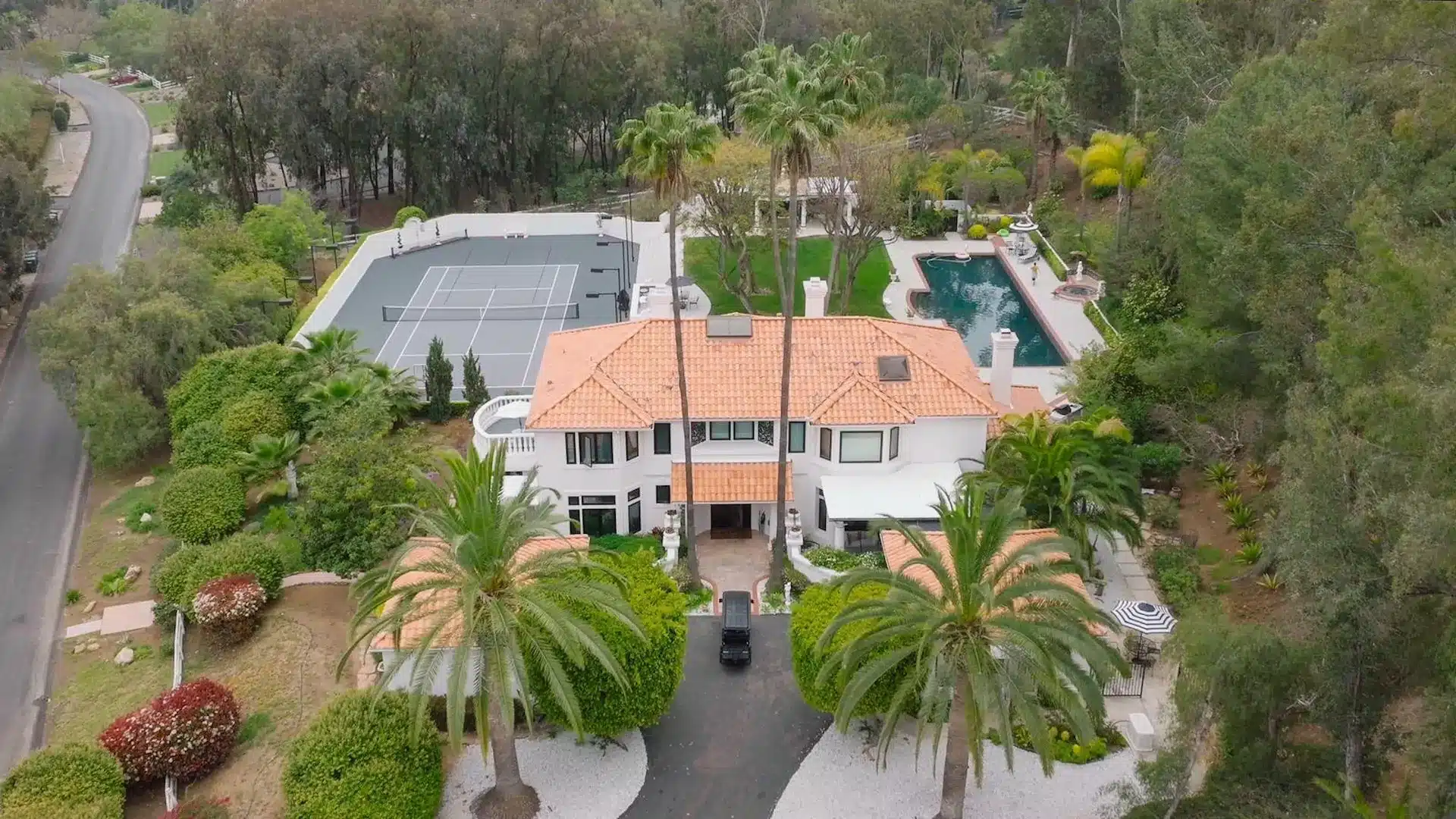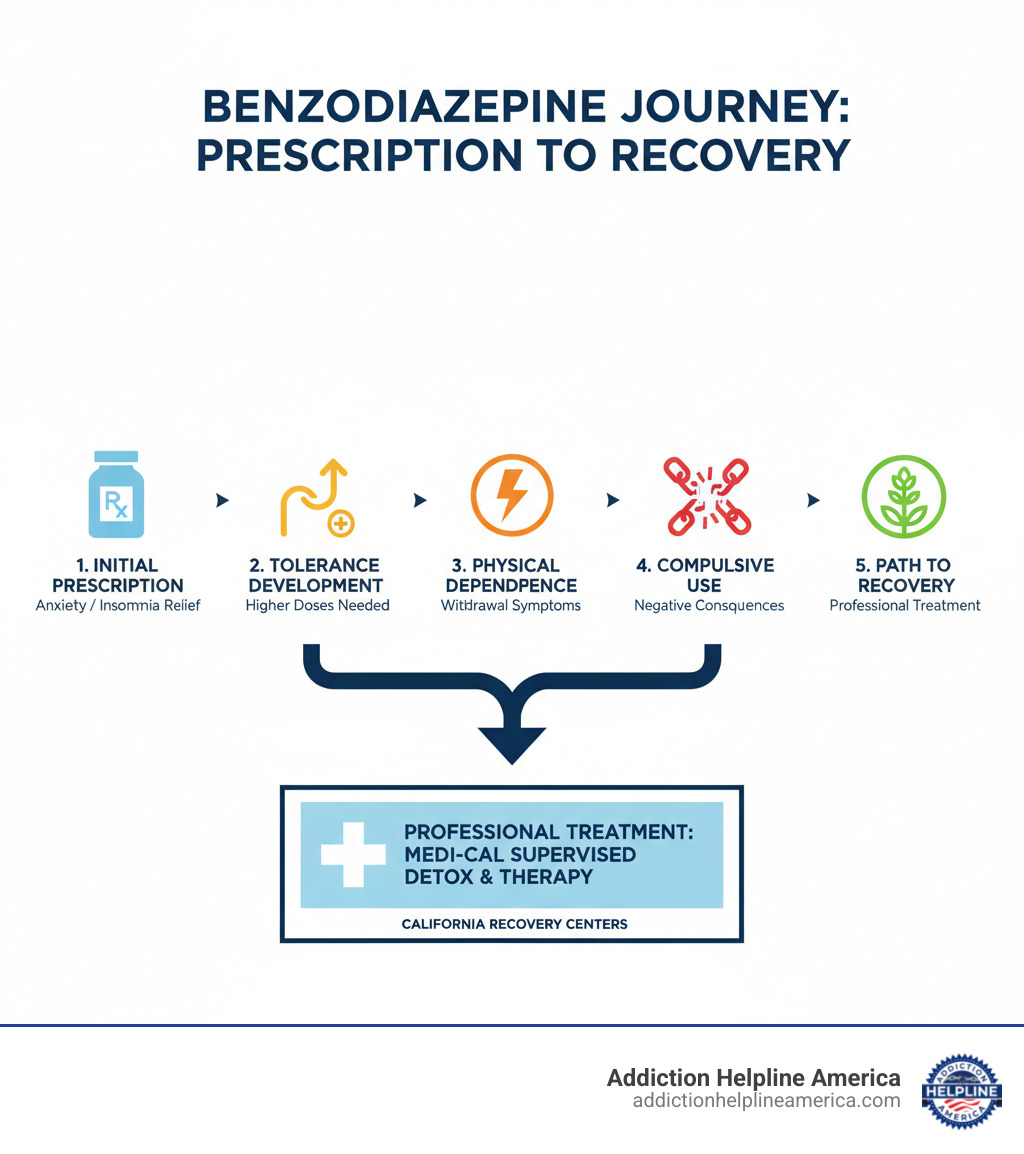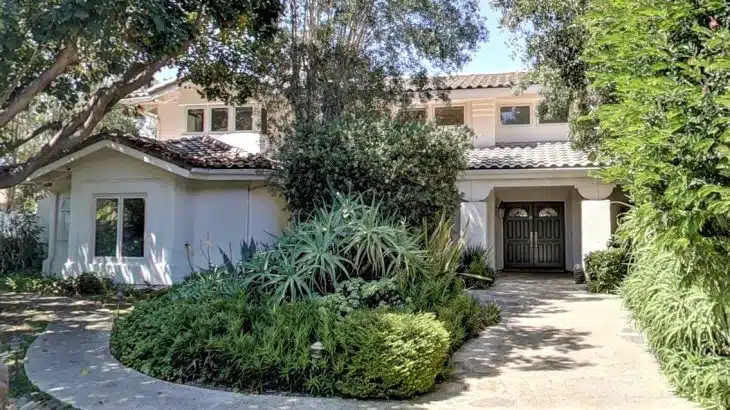
Why Finding the Right Benzo Addiction Treatment Center California Matters
Benzo addiction treatment center california programs offer specialized care that can save lives. If you’re searching for help, here’s what to look for:
Key Features of Top California Benzo Treatment Centers:
- Medically-supervised detox with 24/7 monitoring for safe withdrawal
- Evidence-based therapies like CBT and DBT custom to benzo addiction
- Dual diagnosis treatment for co-occurring mental health disorders
- Individualized care plans that address your unique situation
- Comprehensive aftercare including sober living and ongoing support
- Licensed and accredited facilities meeting California state standards
Benzodiazepines—medications like Xanax, Valium, and Klonopin—are prescribed for anxiety and insomnia. While effective, they carry a high risk of addiction. In the United States, more than 125 million prescriptions are written every year for medications containing benzos, contributing to approximately 300,000 emergency room visits annually.
The path from medical use to addiction can be swift. Tolerance develops quickly, and physical dependence can set in within weeks. Stopping suddenly without medical supervision is dangerous and can be life-threatening.
California offers some of the nation’s best resources for benzo addiction recovery. The state’s treatment centers combine evidence-based medical care with supportive environments. At Addiction Helpline America, we connect individuals with quality benzo addiction treatment center california programs that provide the compassionate, effective care needed for lasting recovery.
This guide will walk you through what you need to know about benzo addiction treatment in California—from how addiction develops to identifying the essential features of top-tier treatment centers.

Benzo addiction treatment center california vocab to learn:
- Drug rehab California
- addiction and rehab hotlines/california numbers
- addiction treatment california
Understanding Benzodiazepine Addiction
Benzodiazepines, or “benzos,” like Xanax and Valium, calm the central nervous system and are prescribed for anxiety, insomnia, and seizures. While they provide relief when taken as directed, benzos are among the most addictive medications prescribed today.
Addiction often begins innocently. A person is prescribed a benzo for a legitimate medical reason. Over time, the body develops a tolerance, and the original dose no longer works as well. A person might take an extra pill, and before long, they are using more than prescribed. This is how physical dependence develops. The brain’s chemistry changes, and the body needs the drug to feel normal. Trying to stop leads to withdrawal symptoms. This is a medical condition that requires professional treatment at a benzo addiction treatment center california.
Psychological addiction is a compulsive craving for the drug, even when it’s causing problems. The drug becomes central to coping with emotions and daily life, affecting relationships, work, and self-worth.

Signs and Symptoms to Watch For
How do you know if benzo use has crossed into addiction? The signs appear in physical, behavioral, and psychological ways.
- Physical Signs: Persistent drowsiness, confusion, poor coordination, memory problems, slurred speech, dizziness, and slowed breathing.
- Behavioral Signs: “Doctor shopping” for multiple prescriptions, buying pills illicitly, taking more than prescribed, hiding use, irritability when unable to use, and neglecting responsibilities at work or home.
- Psychological Signs: Rebound anxiety that is worse than before, depression, mood swings, panic at the thought of running out of pills, and paranoia.
The Dangers of Benzodiazepine Abuse
The risks of benzo abuse are severe and can be fatal.
- Overdose: The danger is especially high when benzos are combined with alcohol or opioids. This combination can dangerously slow breathing and blood pressure, leading to the 300,000 emergency room visits annually related to benzodiazepines.
- Respiratory Depression: Abnormally slow and shallow breathing can deprive the body of oxygen, leading to coma or death.
- Cognitive Impairment: Long-term abuse can damage memory and judgment, leading to blackouts and an inability to make sound decisions.
- Increased Risk of Accidents: Impaired coordination and slowed reaction time increase the risk of falls, car crashes, and workplace accidents.
- Worsened Mental Health: Paradoxically, benzo abuse can worsen anxiety, trigger panic attacks, and cause paranoia.
Long-term abuse affects every area of life, from relationships and finances to physical health. But recovery is absolutely possible. With proper medical supervision and support, people overcome benzo addiction every day. The first step is recognizing the need for help from a specialized treatment center.
The Benzo Addiction Treatment Journey in California
Taking the first step toward recovery from benzodiazepine addiction takes courage. The truth is, trying to quit benzos on your own isn’t just difficult—it can be dangerous. Benzodiazepine withdrawal can cause serious medical complications, including life-threatening seizures. This is why professional help is essential for your safety.

When you reach out to a benzo addiction treatment center california, you’ll begin with a confidential assessment. A treatment specialist will seek to understand your situation—your usage history, dosage, and any co-occurring mental health conditions. Based on this assessment, the team creates an individualized plan custom to your needs.
Treatment duration varies, with residential programs typically lasting 30, 60, or 90 days. However, recovery is a long-term process. Many people continue with aftercare support for months or years to build a strong foundation for lasting sobriety.
Levels of Care: From Detox to Outpatient
Quality benzo addiction treatment center california programs offer a “continuum of care,” moving you through different levels of treatment intensity as you progress.
- Medical Detox: This is the critical first phase. Due to the dangers of benzo withdrawal, you’ll receive 24/7 medical monitoring. Professionals will manage symptoms safely, often using a gradual tapering schedule and medications to ease discomfort and prevent complications.
- Inpatient/Residential Treatment: After detox, many people live at a treatment facility for 30 to 90 days. This structured environment, free from daily triggers, allows you to focus entirely on healing through individual and group therapy.
- Partial Hospitalization Program (PHP): Also known as “day treatment,” PHP offers intensive care (20+ hours per week) while you live at home or in a sober living residence. It bridges the gap between inpatient and outpatient care.
- Intensive Outpatient Program (IOP): IOP provides more flexibility, with 9 to 19 hours of treatment weekly. This level of care is ideal for those who need to maintain work or family responsibilities. Virtual IOP options are also increasingly available.
- Traditional Outpatient & Aftercare: This is the final stage of formal treatment, involving less than 9 hours of programming per week. Aftercare is where long-term recovery takes root, including ongoing therapy, support groups, alumni programs, and sober living arrangements.
How Families Can Support a Loved One
Addiction affects the entire family. If your loved one is struggling, your support is vital, but you also need to care for yourself.
- Educate Yourself: Understand that addiction is a medical condition, not a moral failing. This fosters compassion and more effective support.
- Encourage Treatment: Approach your loved one with calm support, not anger. Express your concerns lovingly. Our team at Addiction Helpline America can help you plan this conversation.
- Participate in Family Programs: Many treatment centers offer family therapy and educational weekends to help families heal together.
- Set Healthy Boundaries: This means not enabling addictive behaviors. It’s a difficult but crucial step in allowing your loved one to face the consequences of their actions while still feeling your emotional support.
- Get Support for Yourself: You are not alone. Groups like Al-Anon or Nar-Anon, as well as individual counseling, can provide you with the support you need to steer this challenging time.
Recovery is possible. With professional treatment and family support, people overcome benzodiazepine addiction and build fulfilling, healthy lives.
Call Now – Your Journey to Recovery Begins Today!

Take the first step towards a healthier life! Call now to connect with our compassionate team and start your recovery journey today. Your path to healing awaits!
Our recovery specialists are available 24/7 to provide support, and all calls are confidential and free. Reach out anytime – we’re here to help!
What Defines a Top Benzo Addiction Treatment Center in California?
California is renowned for its comprehensive addiction treatment landscape. With diverse environments from coastal towns to mountain settings, the state offers a unique backdrop for healing. Southern California, in particular, has strong sober communities and support networks, making it an ideal location for recovery.
When seeking a top-tier benzo addiction treatment center california, look beyond location. The quality of care, therapeutic approach, and commitment to long-term recovery are what matter most. A personalized treatment plan is essential, as every individual’s journey is unique.

Here are the 10 essential features that define an exceptional benzo addiction treatment center california:
1. Medically-Supervised Detoxification
Given the dangers of benzo withdrawal, a top center must provide medically supervised detox with 24/7 monitoring. This ensures safety and comfort, often using a tapering schedule to manage symptoms like seizures and intense anxiety, preparing the individual for therapy.
2. Evidence-Based Therapies
Effective treatment is rooted in science. Leading centers use therapies proven to treat benzo addiction, such as Cognitive Behavioral Therapy (CBT), Dialectical Behavior Therapy (DBT), Motivational Interviewing (MI), and Eye Movement Desensitization and Reprocessing (EMDR) for trauma.
3. Dual Diagnosis and Co-Occurring Disorders Treatment
Substance abuse rarely occurs in isolation. Many individuals have co-occurring mental health issues like anxiety, depression, or PTSD. A top center provides integrated treatment for these dual diagnoses, addressing the whole person to reduce the risk of relapse.
4. Comprehensive Treatment Approaches
Addiction requires a multifaceted approach. The best centers combine various modalities, including Medication-Assisted Treatment (MAT) for a supervised taper, individual and group therapy for skill-building, and family therapy to involve loved ones in the healing process.
5. A Multidisciplinary Team of Experts
An exceptional center employs a team of licensed therapists, counselors, medical doctors, and addiction specialists. This team works collaboratively to provide comprehensive, expert care, with some staff bringing invaluable lived experience from their own recovery.
6. Individualized Treatment Planning
No two individuals are alike, so treatment plans shouldn’t be either. A top center develops customized plans based on each client’s unique needs and history, with ongoing assessments and adjustments to ensure effectiveness.
7. Comprehensive Aftercare and Relapse Prevention
Recovery is a lifelong journey. Effective programs emphasize robust aftercare, including discharge planning, connections to sober living, alumni programs, and ongoing support groups to help individuals maintain long-term sobriety.
8. Holistic and Experiential Therapies
Beyond talk therapy, many centers integrate holistic therapies to promote overall well-being. These can include yoga, meditation, art or music therapy, adventure therapy, and nutritional counseling to support physical and mental healing.
9. State Licensing and Accreditation
To ensure quality and safety, a center must be properly licensed and accredited. Look for facilities licensed by the California Department of Health Care Services (DHCS) and accredited by reputable organizations like the Joint Commission or CARF.
10. A Focus on Long-Term Recovery
The best programs are dedicated to empowering individuals for a life beyond addiction. They focus on teaching sober living skills, building a healthy support network, and fostering a sense of purpose to ensure clients are equipped for a fulfilling, sober life.
Frequently Asked Questions about Benzo Treatment
How much does a benzo addiction treatment center in California cost?
The cost for a benzo addiction treatment center california varies based on the level of care, duration, and amenities. California ranks 23rd nationwide for treatment affordability, with an average cost around $56,654 for a program.
- Medical detox is often covered by insurance as it is medically necessary.
- Inpatient or residential rehab can average around $50,000 for a program.
- Outpatient treatment is more affordable, averaging around $8,000.
Don’t let cost be a barrier. More than half of California’s facilities accept private insurance, and many work with major providers like Blue Cross Blue Shield, Aetna, Cigna, and Kaiser. Over 30% accept Medicaid, and over 60% offer sliding scale payment systems based on income. Contact us at Addiction Helpline America, and we can help you verify your insurance and explore all payment options.
Call Now – Your Journey to Recovery Begins Today!

Take the first step towards a healthier life! Call now to connect with our compassionate team and start your recovery journey today. Your path to healing awaits!
Our recovery specialists are available 24/7 to provide support, and all calls are confidential and free. Reach out anytime – we’re here to help!
How long does benzo addiction treatment last?
Treatment duration is highly individualized. It depends on the severity of the addiction, co-occurring conditions, and personal progress. There is no one-size-fits-all timeline.
A typical journey starts with detox, which can last from a few days to a couple of weeks. This is often followed by inpatient treatment for 30, 60, or 90 days. However, treatment doesn’t end there. Many transition to outpatient programs (PHP or IOP) for several more weeks or months.
Aftercare is the phase that supports long-term success and can extend for months or even years. It involves ongoing therapy, support groups, and alumni programs. Recovery is a journey that requires sustained effort, and this continuum of care is designed to provide support every step of the way.
What is the first step to getting help from a benzo addiction treatment center in California?
Taking the first step is often the hardest, but you’ve already started by seeking information.
Recognize there’s a problem. Acknowledging that you or a loved one needs help is the courageous starting point for recovery.
Reach out for a confidential assessment. You don’t have to figure this out alone. Contact us at Addiction Helpline America to speak with a compassionate specialist. This initial conversation is free, confidential, and without judgment. We’ll help you understand your options and find the right fit.
Verify insurance and discuss payment. We’ll help you steer the financial side of treatment, making the process as straightforward as possible. We work with a vast network of quality treatment centers and will help you find one that fits your clinical and financial needs.
Feeling scared or overwhelmed is normal. We’re here to walk with you through every step. Recovery is possible, and it starts with reaching out.
Find the Right Benzo Addiction Treatment Center Today
You’ve taken an important step by reading this guide. Understanding what makes a benzo addiction treatment center california exceptional—from medically supervised detox and evidence-based therapies to individualized aftercare and proper licensing—empowers you to make an informed decision.
California’s treatment landscape offers a unique environment for healing. Its natural beauty, combined with innovative programs and strong sober communities, represents hope for those seeking freedom from benzodiazepine addiction.
Here’s what we want you to know: recovery from benzo addiction is absolutely possible. We’ve seen countless people who felt trapped and hopeless rebuild their lives with the right support. The key is finding a program that fits your specific needs—not a one-size-fits-all approach.
At Addiction Helpline America, we understand how overwhelming this process can feel. We connect individuals nationwide to addiction and mental health treatment centers, offering free, confidential, and personalized guidance. We take the time to understand your situation, verify your insurance, and help you steer California’s vast network of recovery programs.
Our mission is to help you find the right program that gives you the best chance at lasting recovery. No judgment. No pressure. Just compassionate support when you need it most.
Don’t let another day pass feeling trapped. The courageous step you take today could change everything. Reach out to our team for a confidential conversation about your options. We’re here to help you find hope and healing.
Find a personalized California rehab program with our ultimate guide. Your recovery journey starts with a single phone call.
Our helpline is 100%
free & confidential
If you or someone you care about is struggling with drug or alcohol addiction, we can help you explore your recovery options. Don’t face this challenge alone—seek support from us.
Programs
Resources
Will my insurance
cover addiction
treatment?
We're ready to help
Find the best
drug or alcohol treatment
center
Are you or a loved one struggling with addiction? Call today to speak to a treatment expert.















